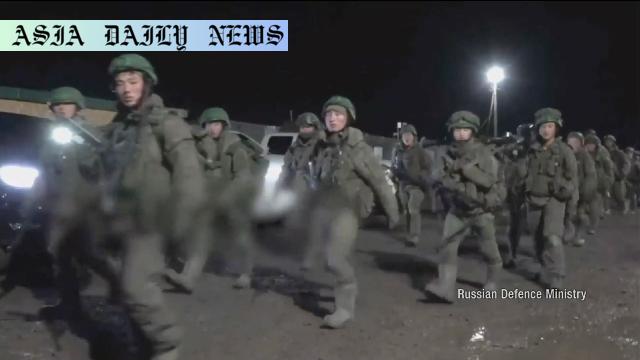North Korea Soldiers bolster Russia’s war effort in Ukraine.

Deepening Military Cooperation: North Korea and Russia
In a surprising and alarming move, North Korea is poised to reinforce its military alliance with Russia by sending an estimated 25,000 to 30,000 troops. This step intensifies their collaboration amid Russia’s ongoing conflict with Ukraine. The development highlights the evolving geopolitical dynamics and the lengths to which nations extend their military and political alliances during a crisis. This deployment comes following an earlier dispatch of 15,000 North Korean troops to Russia in April, showcasing North Korea’s growing inclination to offer direct support to Russia, not just through arms but now through manpower.
Ukrainian intelligence has raised alarms about such significant troop deployments, with mounting evidence indicating that these forces will likely engage in active combat. Satellite imagery of transport planes such as the Ilyushin-76 at North Korean airports suggests preparations for troop movements. Last year, these planes reportedly transported North Korean soldiers to Russia, further solidifying the exchange of military resources.
Implications of North Korea’s Support for Russia
Military collaboration between Pyongyang and Moscow has deepened significantly. Apart from sending troops, North Korea has reportedly supplied ammunition and self-propelled artillery to assist Russia in its war against Ukraine. These actions raise concerns among the international community regarding the scope of North Korea’s direct involvement and its implications for regional peace and security.
Ukrainian concerns extend beyond troop numbers. Analysts suggest that North Korean soldiers might be deployed in strategically critical areas of Russian-occupied Ukraine, where battles have intensified. This potential combat role would significantly alter the stakes of the war, as it effectively introduces thousands of additional soldiers to the field.
The Broader Geopolitical Ramifications
This alliance holds broader ramifications for global geopolitics. By aligning closely with Russia, North Korea signals its intent to position itself more firmly within the Russia-China sphere of influence, opposing Western powers. Meanwhile, Ukraine and its allies, including NATO and the United States, now face the challenge of countering an evolving Russian military force that is increasingly diversified in its sources of support.
This development could also push Western nations to reassess their strategies in aiding Ukraine. Countries opposing Russia’s invasion may need to amplify intelligence gathering, military assistance, and diplomatic strategies to counteract the impact of this reinforcement. The deployment showcases how interconnected conflicts can strain global peace, forcing allied nations to adapt continuously.
Conclusion
As North Korea’s involvement becomes more direct, it not only spells trouble for the situation in Ukraine but also raises questions about the lengths authoritarian regimes will go to support each other. For Ukraine, these reinforcements are a fresh challenge in an already protracted and draining conflict. As more data and intelligence emerge, the international community’s response to this increased military collaboration will likely shape the war’s trajectory in the months to come.
Commentary
North Korea’s Growing Military Role: An Alarming Development
The decision of North Korea to deploy up to 30,000 soldiers to Russia represents a stark reality in modern geopolitics: nations are willing to reinforce and embolden alliances even in the most controversial and condemned wars. While North Korea’s support for Russia isn’t new, the scale of this latest move raises serious concerns not only for Ukraine but also for global stability. This decision underscores a willingness to actively contribute to one of the most pressing conflicts of our times, showcasing a blatant disregard for international norms.
Impact on Geopolitical Alliances
This development symbolizes more than just an additional challenge for Ukraine. It highlights the deepening polarization in global politics—countries increasingly aligning themselves along East and West blocs. Russia’s bond with North Korea represents a shift where military aid and troop deployments aren’t constrained by geographical boundaries or public opinion. The consequential entanglements of these relationships can spell further complications for international diplomacy and conflict resolution frameworks.
The Human Cost of Escalating Alliances
One of the more distressing aspects of this deployment is the human cost. The involvement of tens of thousands of North Korean soldiers in combat zones impacts not just the battlefield but also the families and civilians tied to these individuals. What’s more, these troops are entering a conflict zone rife with destruction and suffering, potentially worsening the humanitarian crisis. The move also places pressure on Ukraine and its allies to fabricate responses that may unintentionally escalate the conflict further.
Conclusion
In conclusion, North Korea’s involvement in the Russian-Ukraine conflict opens up new dynamics in both military strategy and international relations. It pushes the boundaries of direct involvement in proxy wars, demanding a nuanced and strategic response from Ukraine and its Western allies. This act sets a precedent that could very well ripple beyond the region, impacting the balance of power and potentially redefining future conflict zones. As observers, nations, and individuals, it is crucial now more than ever to remain engaged and seek peaceful resolutions while condemning escalations such as this one.


